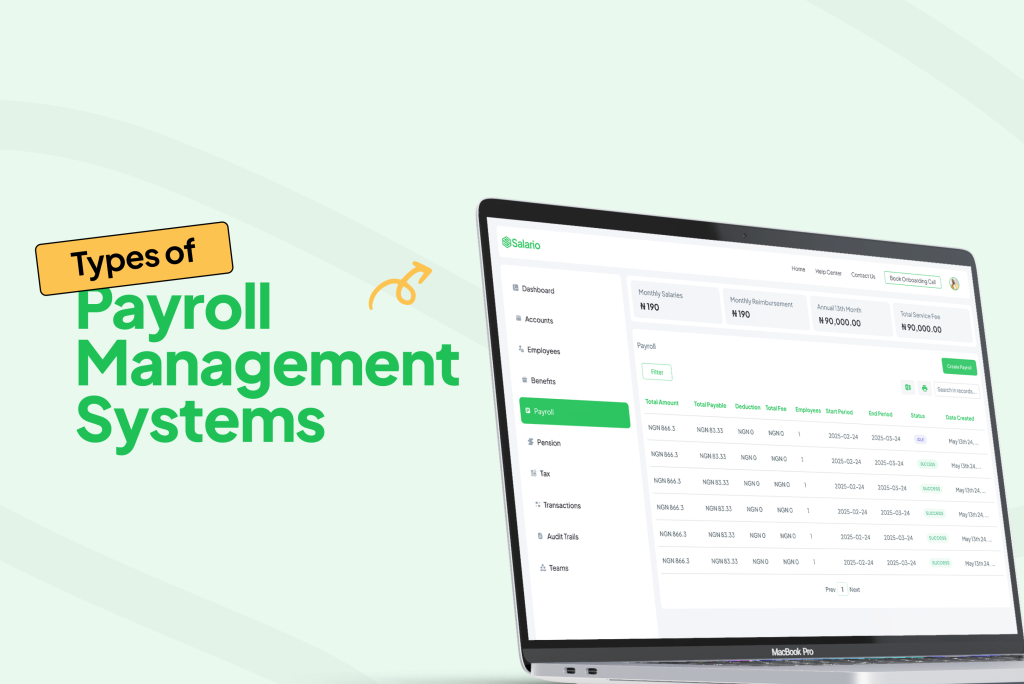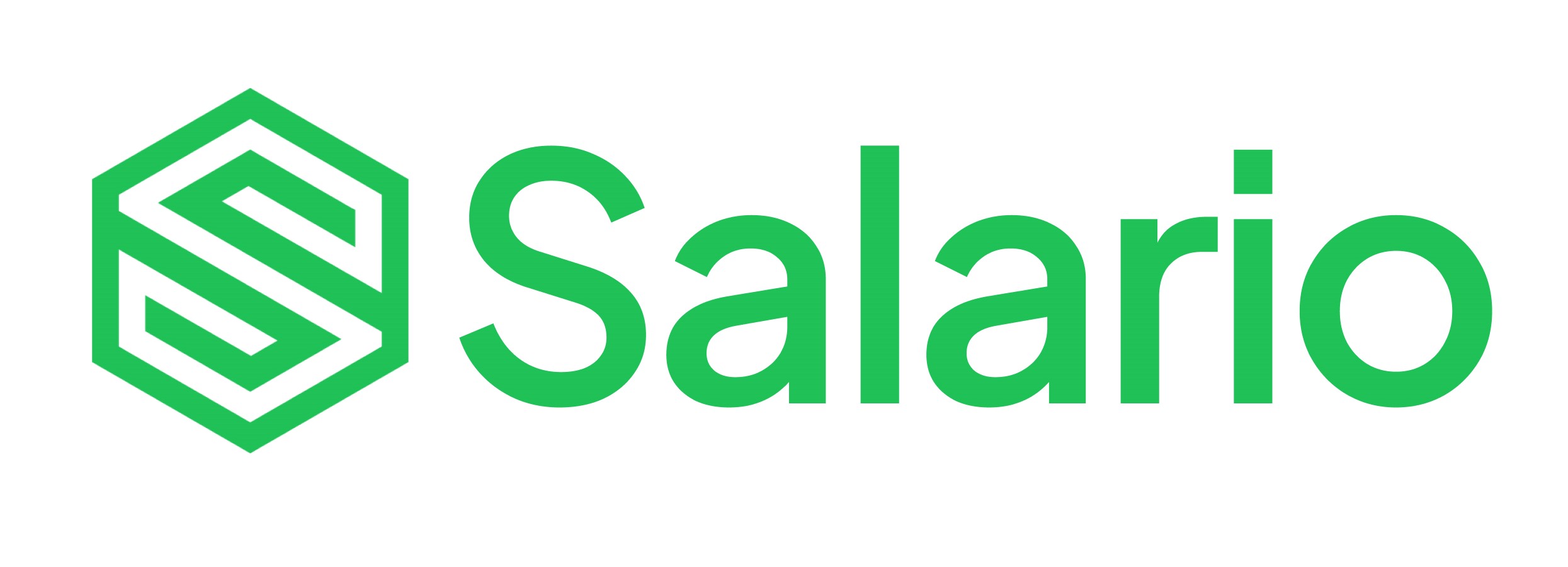
In a bustling corner of Abuja, Ade, the owner of a fast-growing tech startup, found himself caught in a payroll dilemma. With his team expanding rapidly, manually calculating salaries and keeping up with tax regulations was becoming overwhelming. Ade spent hours late into the night juggling spreadsheets, yet errors still crept in. On one hand, he could stick to the manual system he knew, but he realized that it was no longer sustainable. The decision weighed heavily: Should he hire an in-house payroll team, outsource the entire process, or invest in a cloud-based solution? Each type of payroll management system has its merits and challenges, and making the wrong choice could spell disaster for his business’s compliance and efficiency.
The four types of payroll management systems.
Choosing the right payroll management system is a vital decision for businesses of any size. Understanding the differences between each type can help you manage employee compensation efficiently while staying compliant with tax and labor laws. Below are the four main types of payroll systems, expanded with real-life relevance, particularly for businesses in Nigeria.
1. Manual Payroll Systems
Manual payroll systems involve processing payroll tasks by hand without the use of specialized software. Small businesses typically adopt this method with a limited number of employees. Managers rely on paper records, calculators, and spreadsheets to track employee hours, tax deductions, and payments. In regions like Nigeria, where smaller businesses often operate informally, this system may seem convenient due to its low cost and simplicity. Often manual payroll systems are compared with more automated options.
Pros:
- Low cost: No need for expensive software or subscriptions.
- Complete control: Direct oversight allows for high customization.
- Simplicity: Ideal for businesses with few employees.
Cons:
- Time-consuming: Manually calculating payroll for every employee can take hours.
- Error-prone: Increased risk of calculation errors that can lead to tax issues or under/overpayment.
- Compliance challenges: Staying up-to-date with tax laws is difficult without software to assist.
2. In-House Payroll Systems

In-house payroll systems involve using specialized software managed by internal staff. This is popular among medium-sized companies with the resources to invest in payroll software but prefer not to outsource the function. Businesses in Nigeria with a growing workforce often opt for this system to maintain control over payroll processes while taking advantage of technology for accuracy and compliance.
Pros:
- Control: Payroll data stays within the company, ensuring privacy.
- Adaptability: Companies can tailor the system to their needs and compliance requirements.
- Security: Sensitive data is kept in-house, reducing exposure to external threats.
Cons:
- Initial investment: Requires financial resources to purchase software and hire skilled personnel.
- Training needed: Employees must be trained to use the software and understand payroll compliance.
- Risk of internal errors: Mistakes can still occur, particularly when staff lack experience with payroll systems.
3. Outsourced Payroll Systems
With an outsourced payroll system, businesses hire external companies to manage their payroll needs. This approach is common for organizations that prefer to focus on core business functions and leave payroll to the experts. In Nigeria, companies experiencing rapid growth often find outsourcing payroll to be a cost-effective solution that reduces internal workloads and ensures compliance with local tax regulations.
Pros:
- Time-saving: Frees up internal staff to focus on other tasks.
- Expertise: Payroll is handled by professionals who are well-versed in current laws and regulations.
- Accuracy: Outsourcing reduces the likelihood of mistakes, as dedicated payroll firms focus solely on these tasks.
Cons:
- Expensive: Outsourcing can be costly, especially for smaller businesses.
- Less control: External providers handle all payroll data, leading to concerns over privacy.
- Limited customization: Tailoring payroll processes to the business’s unique needs may be harder.
4. Cloud-Based Payroll Systems

Cloud-based payroll systems offer online platforms that automate and simplify payroll tasks. These systems can be accessed from any internet-connected device, making them ideal for companies with remote teams. As businesses increasingly embrace digital transformation in Nigeria, cloud-based systems are becoming a preferred choice due to their scalability, ease of use, and remote accessibility.
Pros:
- Accessibility: Manage payroll from anywhere, which is particularly useful for businesses with remote employees.
- Automation: Reduces human error by automating tax calculations, payments, and filings.
- Scalability: As businesses grow, cloud-based systems can quickly adapt to handle larger workforces.
Cons:
- Cost: Subscription fees can add up over time.
- Internet dependency: Requires a stable internet connection to access and manage the system.
- Cybersecurity risks: Storing sensitive payroll data online can expose the company to hacking attempts.
Which Payroll System is the Best?
The best payroll system depends on your business’s specific needs. Small businesses with limited staff may find manual payroll systems sufficient, while mid-sized companies prefer in-house systems for greater control. Fast-growing or larger enterprises often benefit from outsourcing or cloud-based payroll systems due to their efficiency and accuracy.
Conclusion
Choosing the right payroll system is crucial, whether you’re a small business just starting or a rapidly expanding company like Ade’s. After careful consideration, Ade ultimately decided to go for a cloud-based payroll system, which provided the scalability, ease of use, and accuracy he needed. Now, he has more time to focus on growing his business without worrying about payroll compliance.
Are you curious about how a cloud-based system could benefit your business? At Salario, we offer a top-tier solution tailored for Nigerian businesses. Want to discover how we can help streamline your payroll, save you time, and ensure compliance? Book a free demo with us now.
